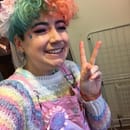It often seems that unless you are a cisgender male, gender has a way of messing with your opportunities.
I’ve known that I wanted to be a journalist since the age of 10. The more I learnt about the female struggle as I progressed through an ‘all-girl’ secondary school education, the more I thought about how I would need to learn how to navigate journalism as a woman. How would I get into this traditionally male industry and prove myself to be just as good, if not better than my male counterparts?
When I realised I was bisexual at the age of fifteen, I had the extra obstacle of being a queer woman in journalism. But, at least as I was growing up, I began to see this kind of representation in the news. More and more female writers were taking centre stage and bringing their unique perspectives to the public. Events and campaigns were launched to get women into media. Things were looking up.
That’s when I realised that I wasn’t a woman. Or was I?
I am an assigned female at birth demigirl. This means that I’m a non-binary person who feels slightly feminine but not fully female. I’m not transmasculine, and I can’t be transfeminine by virtue of being assigned female at birth. I guess I’m a bit of an oddball in the eyes of people only familiar with the ‘traditional’ trans story.
I recently encountered this gender problem – to woman or not to woman – when looking at ways to improve my CV. Manchester holds an annual Women In Media Conference that I’ve wanted to attend since moving here, but never have due to being non-binary.
Despite this, I still get treated like a woman on a daily basis. To the average passer-by, I probably look like a girl. A very colourful, probably queer girl, but not necessarily a non-binary person. This is because there is no way to “look non-binary”. There are no rules.
For me, realising I wasn’t female allowed me to embrace my femininity. But due to my hyperfeminine presentation, I am read as female when people don’t know me personally – on the street, at work, etc. This leads to misdirected misogyny being thrown my way. I get creepy comments at work from strange men, I get catcalled and I get judged for playing video games by guys online.
So, with this in mind, I realised that I probably qualify for the Women In Media Conference. I lived as a woman for 17 years of my life and still experience the effects of misogyny to this day. It’s highly likely that when applying for jobs in journalism, I will be treated like a woman somewhere in the process.
My main issue was that I felt bad for potentially taking places from ‘actual’ women, but further research revealed that a small number of the attendees each year are men, which definitely helps with that guilt. I spoke to the organisers and they said I’d be more than welcome. I think the main issue here was one of word choice, not ideology.
Some places have opted to expand traditionally women-only events to women and non-binary people, but this comes with its own issues. Transmasculine non-binary people do not face the same issues as other non-binary people and also might not want to be lumped in with women given their assigned gender at birth. The best way to avoid this issue would be to call events ‘self-defining women and feminine people’ events or ‘women and female aligned people’ events but those are too wordy and not good for marketing.
I think the main thing to take from this experience is that 1) ideas of gender make everything WAY more complicated than it needs to be, and 2) if you think you should be able to go to an event, just go!
Something like gender should never stop you from living your life and pursuing your dreams



